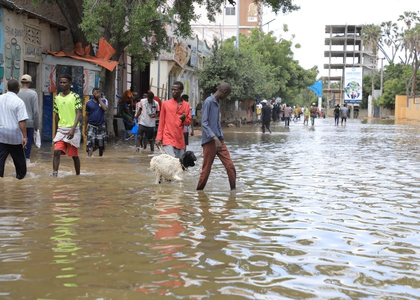Flash floods kill 17, displace over 84,000 people in Somalia
By IANS | Updated: May 14, 2025 13:52 IST2025-05-14T13:48:26+5:302025-05-14T13:52:49+5:30
Mogadishu, May 14 At least 17 people have been killed and more than 84,000 others displaced by flash ...

Flash floods kill 17, displace over 84,000 people in Somalia
Mogadishu, May 14 At least 17 people have been killed and more than 84,000 others displaced by flash floods following torrential rains across Somalia since mid-April, the United Nations relief agency said.
The UN Office for the Coordination of Humanitarian Affairs (OCHA) said an assessment conducted by disaster management officials has revealed extensive damage to infrastructure and an urgent need for assistance to affected people.
"Partners have stepped up assistance in affected areas, including food, shelter items, hygiene kits, and cash assistance," OCHA said in its latest flash update released in Mogadishu, the capital of Somalia.
It said heavy rains in the Banadir Region on May 9 caused devastating flash floods that killed nine people, affected at least 24,600 people, damaged key infrastructure in several districts, and swept away shelters in displacement sites.
Light to heavy Gu (April to June) seasonal rains have triggered localised flooding in several parts of the country since mid-April. The UN agency said the Somali government has formed a committee that includes federal ministers and regional officials to respond to the flooding crisis.
Somalia, a country where nearly two-thirds of the population depends on agriculture for their livelihoods, has experienced extreme climate shocks in the past, including prolonged dry seasons causing drought and heavy rains leading to flooding, Xinhua news agency reported.
The floodwaters have damaged key infrastructure and paralysed public transport in some parts of the country, the UN agency said.
"On a positive note, the rains have significantly improved water and pasture availability in many areas, supporting ongoing agricultural activities and pastoralism, thereby mitigating the effects of recent prolonged dry conditions," OCHA added.
Floodwaters also damaged key infrastructure, halting public transport and temporarily disrupting operations at the main Aden Abdulle airport.
The Horn of Africa is one of the regions most vulnerable to climate change, and extreme weather events are becoming increasingly frequent and intense.
Disclaimer: This post has been auto-published from an agency feed without any modifications to the text and has not been reviewed by an editor
Open in app